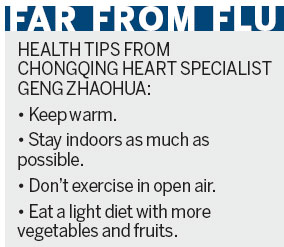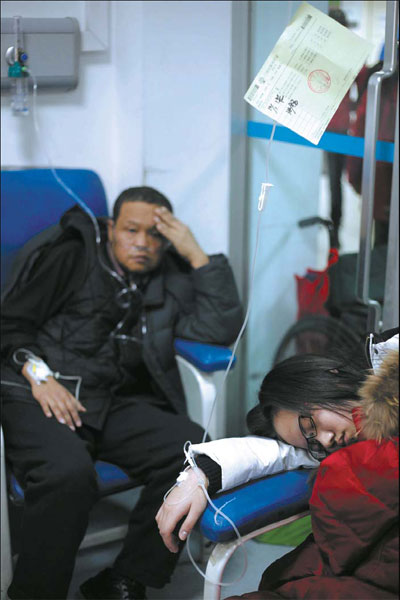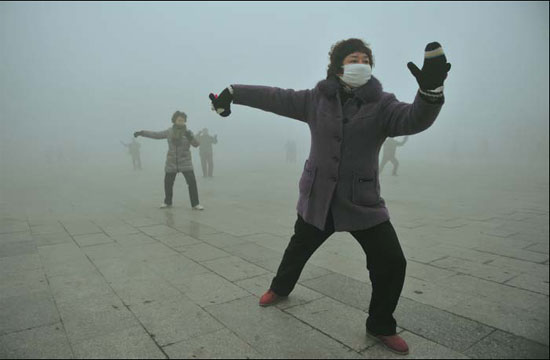Sum of all fears
Updated: 2013-01-16 07:28
By Liu Zhihua and Eric Jou (China Daily)
|
||||||||
|
The cold and bad air quality sent an influx of patients into the China-Japan Friendship Hospital's emergency room. Wang Jing / China Daily |
Flu, smog and sub-freezing temperatures have combined to create a health scare in many parts of China, especially in Beijing. The experts tell Liu Zhihua and Eric Jou that it's a bad year, but there's no epidemic.
A huge blanket of haze that mired Beijing, compounded by cold weather, suggested a perfect storm for a worst-ever flu season. On Saturday, a surge of patients hit the emergency room of China-Japan Friendship Hospital, coughing and wheezing with flu-like symptoms. Feng Kai, 23, felt sick in the morning and decided to visit the hospital for a checkup.
"I was swimming, and I may have caught a cold," he said. "I came in after I had a fever and now I'm stuck on this IV drip." It will be with him for three more days.
Lee Jian, 25, also received an IV in the arm. He said he was persuaded to brave the cold for a hospital visit by his girlfriend, after discovering that he had a 39.5 C fever.
China-Japan's respiratory specialist Zhang Shu'nan says that he's seen a patient increase of about 20-30 percent in the last couple of days. Zhang says that some patients are coming in complaining of complications worsened by the cold weather and the smog.
Xu Qian, director of China-Japan Friendship Hospital's Infectious Disease ward, also says that there has been a marked increase in the number of daily outpatients, who are coming in with such symptoms as fever, headache, sore throat and runny nose that may be attributed to the flu.
"On a normal to slow day, we would have about 100 people show up to be tested. Even in peak flu season we won't see too many people. This year we're seeing a marked increase of about 200 to 300 patients a day," says Xu.
Xu says that this growth in patients is perfectly normal because the nature of the flu is cyclical. She says that one year the flu can be particularly bad and another it could be good, all depending on the strain of the virus that hits.
Of course the weather and environmental issues all affect the spread of the influenza virus. Beijing Hospital's doctor Ke Huixing says that there are slight correlations between the spread of the flu and environmental factors.
"The cold air and smog might not affect the spread of the flu directly, but the depressing environment can have effects on the human body and psyche," says Ke.
"Depressing environments can lead to a lowering of the body's immune system making it more susceptible to illnesses. Small particles in air pollution can also help spread the virus," Ke adds.
Saturday saw the density of PM2.5 - air particles smaller than 2.5 microns and able to enter the lungs - climb higher than 900 micrograms per cubic meter in several districts in the capital, according to the Beijing Municipal Environmental Monitoring Center.
That's the highest level recorded in Beijing.
The World Health Organization considers the safe daily level to be 25 micrograms per cubic meter.
The problem has now become a national phenomenon, rather than one unique to Beijing. On Saturday, levels of PM2.5 passed 300 micrograms per cubic meter in 33 of the 74 cities with systems equipped to monitor the particles.
"Larger particles can be filtered by the nose and expelled through the respiratory tract, PM2.5 and viruses can become lodged deep in the lungs and produce harmful effects," says China-Japan's Zhang.

"PM2.5 exposure is linked to a variety of both upper and lower respiratory illnesses, including flu, cold, asthma, bronchitis and chronic obstructive pulmonary disease, as well as to worsening cardiovascular diseases."
Zhang says PM2.5 is more hazardous to people with weaker immune systems, such as children and the elderly.
In Chongqing, often nicknamed the "fog city", the haze has also increased the number of patients in the emergency room.
Geng Zhaohua, a cardiovascular diseases specialist with Xinqiao Hospital, says they've seen at least a 20-percent increase of patients compared to last year.
"Particles in the air are not only harmful to respiratory tracts, but are also likely to produce irritation and diseases in cardiovascular system, because of the reduced oxygen intake.
"Besides, when it is cold, the blood vessels contract and result in higher blood pressure, which will contribute to such cardiovascular diseases as heart attack and stroke," Geng says.
Despite all the problems that air pollution, cold weather and the flu can create, doctors interviewed by China Daily say there is no need to panic. They highly recommend people receive vaccinations and stay indoors while the smog lingers.
"Many people are confused if they should continue to exercise in such weather. It is absolutely not wise to exercise in such cold and smoggy days. The loss overwhelms the gain," China-Japan hospital's Zhang says.
Doctor Richard Saint Cyr of Beijing's United Family Hospital says that now is the perfect time to get the flu vaccine, especially for the elderly, pregnant women and children.
"No one is saying it's a serious pandemic, they're just saying it's a relatively bad year. I don't think it's any more worrying than the usual flu season concerns, certainly nothing like an H1N1 pandemic scare.
"The situation can change quickly, of course, but right now it just appears to be a bad but not serious flu season," he says.
Contact the writers at liuzhihua@chinadaily.com.cn and ericjou@chinadaily.com.cn.
|
Residents in Fuyang, Anhui province continued morning exercises in spite of thick smog which had reduced visibility to less than 50 meters on Jan 14. An Xin / For China Daily |
(China Daily 01/16/2013 page19)

 In Photos: 7.0-magnitude quake hits Sichuan
In Photos: 7.0-magnitude quake hits Sichuan
 Li Na on Time cover, makes influential 100 list
Li Na on Time cover, makes influential 100 list
 FBI releases photos of 2 Boston bombings suspects
FBI releases photos of 2 Boston bombings suspects
 World's wackiest hairstyles
World's wackiest hairstyles
 Sandstorms strike Northwest China
Sandstorms strike Northwest China
 Never-seen photos of Madonna on display
Never-seen photos of Madonna on display
 H7N9 outbreak linked to waterfowl migration
H7N9 outbreak linked to waterfowl migration
 Dozens feared dead in Texas plant blast
Dozens feared dead in Texas plant blast
Most Viewed
Editor's Picks

|

|

|

|

|

|
Today's Top News
Live report: 7.0-magnitude quake hits Sichuan, heavy casualties feared
Boston suspect cornered on boat
Cross-talk artist helps to spread the word
'Green' awareness levels drop in Beijing
Palace Museum spruces up
First couple on Time's list of most influential
H7N9 flu transmission studied
Trading channels 'need to broaden'
US Weekly

|

|









